I can't figure out why MySQL is so slow summing less than 400 rows. Both u and t have indexes and return the rows quickly.
SELECT sum(t) FROM `s_table`
WHERE `u` LIKE 'dogs%'
AND `t`> 10000
Query took 3.5299
If I remove the sum part of the query.
SELECT t FROM `s_table`
WHERE `u` LIKE 'dogs%'
AND `t`> 10000
Query took 0.0090 seconds returns 397 rows.
So to sum 397 rows takes over 3 seconds!
Then I tried.
SELECT SUM(t)
FROM ( SELECT t
FROM s_table
WHERE `u` LIKE 'dogs%'
AND `t`> 10000
) AS total;
Query took 3.5767 seconds, so basically the same as the first query.
I'm going insane here. Why is it taking MySQL over 3 seconds to sum only 398 numbers?
Here is the explain:
CREATE TABLE `s_table` (
`id` int(11) NOT NULL AUTO_INCREMENT,
`s` varchar(100) NOT NULL,
`v` int(12) NOT NULL,
`c` float NOT NULL,
`r` int(3) NOT NULL,
`u` varchar(350) NOT NULL,
`w` int(1) NOT NULL,
`t` int(12) NOT NULL,
`date` timestamp NOT NULL DEFAULT CURRENT_TIMESTAMP ON UPDATE CURRENT_TIMESTAMP,
PRIMARY KEY (`id`),
KEY `idx_v` (`v`),
KEY `idx_c` (`c`),
KEY `idx_r` (`r`),
KEY `idx_u` (`u`),
KEY `idx_t` (`t`),
KEY `idx_date` (`date`),
KEY `s` (`s`)
) ENGINE=InnoDB DEFAULT CHARSET=latin1 ROW_FORMAT=COMPRESSED

